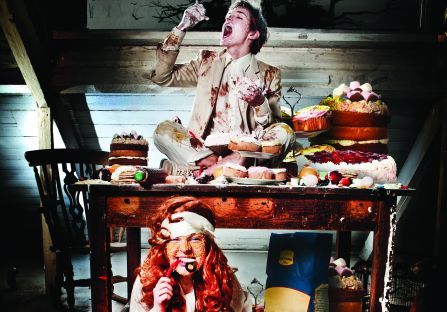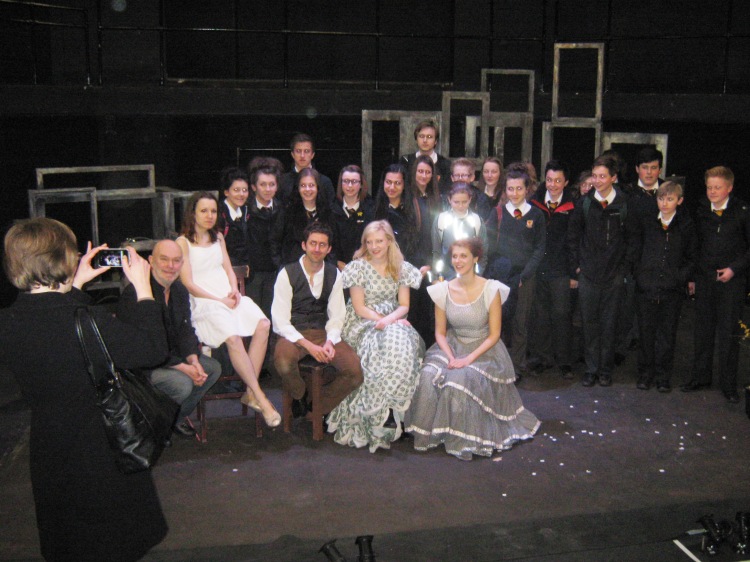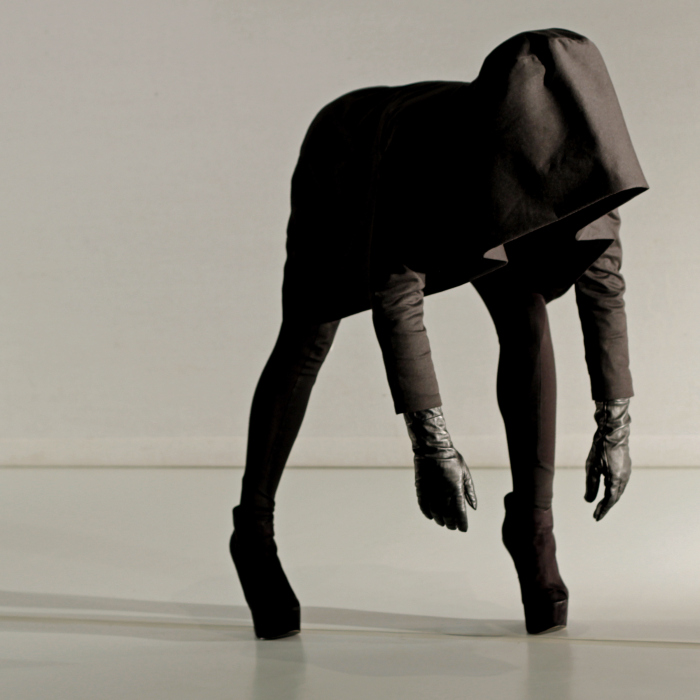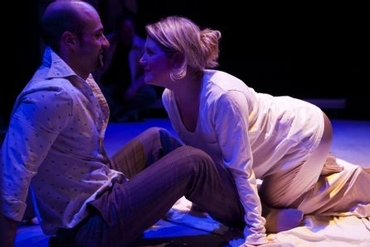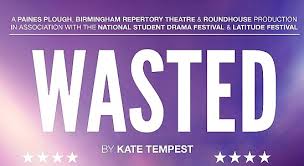
Wasted
By Kate Tempest
At Sherman Cymru, Theatre 2
23rd March 2013
Once in a while a production will come along that creates a huge buzz. When you miss a show like that you know that there’s usually no way you’ll ever get to see it. Luckily for those who missed it first time round Wasted came back for a second nationwide tour. If you missed it this time you really have missed out!
Three friends, who are maybe more than friends and maybe less, are forced to face up to all the opportunities they wasted because they were…..well, wasted. On the tenth anniversary of their childhood friend’s death they ask what went wrong and how can I make it right. But is the middle of a rave in South London really the place for these twenty five year olds to make a change for the better?
The pace of this short play is staggering, during the twenty-four hours we follow the three disillusioned Londoners no part of their lives is left unexamined. Why doesn’t downtrodden Ted (Cary Crankson)leave his Ikea loving girlfriend and get the job of his dreams? When will Danny (Bradley Taylor) realise his band is going nowhere? And how did Charlotte (Lizzy Watts) fall out of love with her calling to be a teacher?
Written by performance poet and rapper Kate Tempest, her theatrical debut is nothing short of amazing. Tempest has a way of bending words to make them fit into her beautiful urban poetry that never once sounds forced or insincere. In fact her down to earth and rhythmic approach to word play ensures the production is hard hitting, honest and true.
Naturalistic scenes in parks, cafes and clubs are broken up by bare-all monologues and stylised choral scenes directed straight at the audience that are worthy of any music stage. The actors do an absolutely stunning job of navigating the rhythms and layers of Tempest’s words, slipping effortlessly between their characters everyday life and the choreographed group sections.
As if there wasn’t enough to be entertained by already the innovative use of multimedia added yet another level to the polished show. A large screen provided clues to the setting of each scene; a neon sign telling us the cafe is open or a beautifully shot pub interior. During the powerful monologues the screen showed close ups of the actor’s face that were cleverly matched to the onstage lighting and added yet more emotion to the already intense words.
A beautiful symphony of words, music and technology. This is the kind of theatre that gets people excited, makes them talk and inspires them to make a change. The innovative combinations of media and poetry make this rather straightforward study of modern urban life something unmissable. Let’s hope they will be back by popular demand for a third outing soon!
A Paine’s Plough, Birmingham Repertory Theatre and Roundhouse production, in association with the National Student Drama Festival and Latitude Festival.
For more about the show and producers Paine’s Plough: www.painesplough.com
For more on Kate Tempest: www.katetempest.co.uk
Category Archives: Theatre
Grimm Tales Theatr Iolo review by Katie Treherne
After studying Carol Ann Duffy’s work in school, I can say that my expectations were set high as I sat amongst an audience of restless young minds and excited adults alike. I couldn’t wait to see how Duffy’s vivid imagination and blunt tone would play out on stage in comparison to the short poems I’d analysed so carefully.
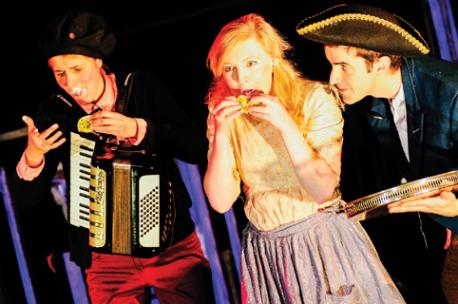
The play featured four young, talented actors that sang and waltzed and even pecked their way across the stage, using the lack of props to their best of their ability as they gave two exemplary performances of the infamous tales, Hansel and Gretel and Ashputtel.
Needless to say, the children in the audience settled down quickly as the production began with the eerily soothing voices of Hansel and Gretel’s family, and they stared at the awe-filled children with big eyes, maintaining enough eye contact with each spectator as to include each and every person in the new world they presented.
Although the tale of Hansel and Gretel delivered a more melancholy side of Duffy’s imagination, the ending was sure to warm the hearts of every parent in the room, enough to prepare them for the big dose of fun the second half of the production was ready to lump on top of them, and, true to its name, Ashputter left in its wake a layer of ashes impossible to shake off after it’s spectacularly bright show.
At one point towards the end of show, a step-sister screeched mid-stage as she used a plastic axe to saw off the tips of her toes that she couldn’t fit into the slipper. Although the guffaws of the children suggested they found the act funny, I’m sure some parents, as well as myself, found the incessant screaming and fake bloody rag more than a little bit alarming. This was not a rare occurrence either, as body parts were chopped off on two occasions.
On the whole, Grimm Tales was an eye-opening, funny, and family-orientated production I wouldn’t hasten to recommend to a family with younger children, so long as the members were okay with a little bit of gore.
Grimm Tales Theatr Iolo by Malikah Saba
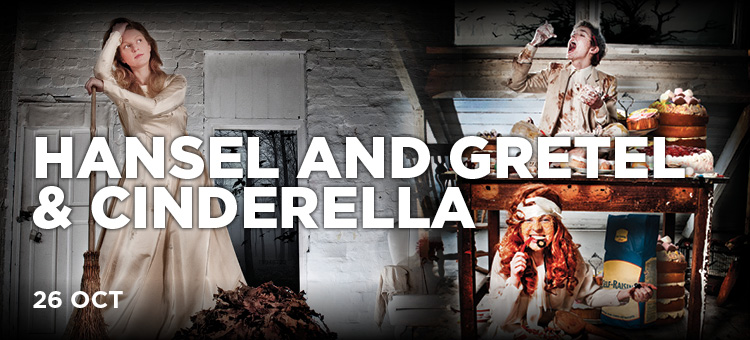
Poet Laureate Carol Ann Duffy and Theatr Iolo produced the magical stories of the Grimm Brothers which included the tales of Ashputtel which is the original Cinderella story, and Hansel and Gretel, which I saw at Sherman Cymru, Cardiff.
The production consisted of just four actors, who played all the designated roles simultaneously. This was by far the best show presented. It offered goriness, fear and appraisable imagination. It took a turn back in time; rather than showing the predictable show of lust, hope and forgiveness, it allowed for the younger audience to be revealed ever so gently to the disappointments and punishments of life. It had many memorising moments within the production, alongside many frightening parts, such as the birds pecking the eyes out of the two step sisters. Although the production was aimed at a young audience, it gave them the chance to relate to mature content. The gasps in the audience indicated that the audience was surprised each time the play took a new turning. It was a chance for the 21st century audience to see a combination of modern with traditional. The play elegantly summed up the original story of the Grimm Brothers with the appropriate level of obscurity.
Overall the production was a great success, as it intrigued the audience; it allowed the audience to search their imagination and come up with their own twists and outcomes of the play.
YC Review, Grimm Tales, Theatr Iolo.
Grimm Tales Review – Cardiff Sherman Theatre 27th February 2013
The production was put on by four talented actors who cleverly interlinked storytelling and performing when showcasing two of the Brothers Grimm fairy tales – Ashputtel and Hansel and Gretel. Everybody has seen and heard of the Disney take on these famous fairy tales but it was refreshing to watch a slightly different version of events. The cast acted out the original tales and kept the audience captivated throughout with special sound effects and music that brought the stories to life, with each actor playing different instruments throughout the shows. Although the set was basic without too many props, the performers used it in such a way that entranced viewers and allowed them to also use their own imaginations to envisage the events unfolding before them.
The atmosphere in the room was enjoyable with many moments where the room gasped and laughed together at certain points in the stories. Arguably, having only four cast members is not ideal for most performances, but it really allowed the audience to concentrate and identify with the actors as they are performing and it meant that there was less distraction for them. They were able to focus on the original message of Grimm’s fairy tales without being bogged down by too much happening on stage at once.
The production was directed by Kevin Lewis and adapted by Carol Ann Duffy who evidently make a great pairing when creating shows suitable for a wide range of people. Children, adults and teenagers alike are able to enjoy this magical show which is especially great for families, keeping you entertained and involved throughout.
A highly enjoyable show where you often find yourself forgetting about everything else; and feeling eager to discover what happens next in the twists and turns of these tales.
Amy Sandford
A Grimm Tale or two for Brynteg Young Critics.
YC Review Hide Chelsey Gillard
Happy 30th Birthday to Disability Arts Cymru!

Last night saw a celebratory evening for Disability Arts Cymru as they reached their 30th Birthday.
The evening launched the company’s new website and also featured performances by the Unusual Stage School and the musician Dai Sharkey.
Held at Chapter Arts Centre, the evening began with the performance of ‘Remote Exit’, a play by Welsh writer Meredydd Barker. The Unusual Stage School was developed in 2006, when 12 disabled actors undertook a residential training course. Since its beginning, the USS has provided unique acting opportunities for talented disabled actors throughout Wales. With a small cast of six, the play explores themes of illness and dependency within the confines of the family unit. Despite having serious undertones, the script was punctuated by natural, often dialectical humour, with plenty of opportunities to insert comical scenes.
The cast (Kate Hampton, Andria Doherty, Richard Newnham, Laura Morgan, Lindsay Foster, Michael Karampelis) were a strong ensemble, especially when specific actors needed to slip in and out of multiple roles. There was good use of a split scene, and the simple set proved helpful for swift scene changes.
The accessibility of the piece was extremely impressive; in many ways, it was more accessible than any other kind of theatre. There was use of a sign language interpreter along with a captioning screen. The whole performance was well produced and directed.
Disability Arts Cymru’s new website looks great, and you can find it here. http://www.disabilityartscymru.co.uk/
Happy Birthday to the company!
YC Review Sexual Perversity in Chicago Chelsey Gillard
Adolygiad Y Bont gan Rachel Morgan
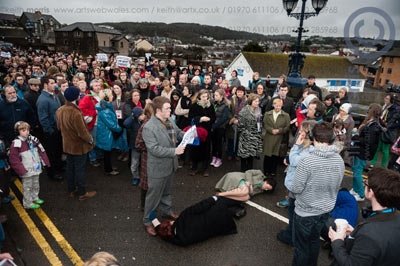
Y Bont, Theatr Genedlaethol Cymru., Aberystwyth, February 6, 2013
Roedd awyrgylch trydanol yn llenwi cyntedd Canolfan y Celfyddydau yn Aberystwyth ar brynhawn Sul cyn dechrau perfformiad unigryw Theatr Genedlaethol Cymru o’r Bont. Ac nid yw’n syndod ychwaith ; roedd 500 ohonom yn aros yn eiddgar i’r hyn a ddisgrifiwyd cynt fel perfformiad a fyddai’n ‘plethu theatr byw gyda ffilm, technoleg ddigidol, a chyfryngau cymdeithasol i greu un digwyddiad bythgofiadwy’. *
Heb os, roeddem yn aros i fod yn rhan o berfformiad a fyddai’n garreg filltir bwysig yn hanes y Theatr Cymraeg yng Nghymru, ac o’m rhan fi fy hun, ni chefais fy siomi.
Protest cyntaf Cymdeithas yr Iaith Gymraeg, hanner can mlynedd ynghynt, ar bont Trefechan a ysgogodd y ddrama a cheisio ail greu digwyddiadau’r diwrnod pwysig hwnnw a’i phlethu â’r presennol oedd amcan uchelgeisiol y perfformiad.
Ar ôl cael ein tywys i ganol y dre ar fysiau o gyfnod y 60au cerddon yn un dorf fawr i wylio’r myfyrwyr ifainc yn gosod posteri y tu allan i Swyddfa Bost Aberystwyth yn hawlio statws swyddogol i’r Gymraeg.Aethom o’r fan honno i gaffis gwahanol y dre i fwyta pice ar y maen ac i yfed te o gwpanau a soseri, (rhaid canmol pwy bynnag penderfynodd defnyddio soseri a chwpanau)!
Er i ni gael eistedd a chynhesu mewn caffis nid toriad hanner amser oedd hwn, serch hynny, oherwydd i’r perfformiad parhau ar ffurf fideo wrth inni wylio protestwyr 1963 yn hel atgofion am y brotest wreiddiol. Roedd defnyddio geiriau’r protestwyr gwreiddiol, nid yn unig yn wers hanes diddorol ac addysgiadol i’r gynulleidfa, ond yn dechneg effeithiol i gynnal momentwm y presennol. Llwyddodd ei geiriau nhw, ochr yn ochr â deialog yr actorion oedd i glywed yn uchel yn y caffi creu ymdeimlad o gyffro wrth inni sylwi ein bod yn agosáu at uchafbwynt y perfformiad ; cerdded at y Bont.
Dyma oedd fy hoff ran i o’r ddrama. Yn ffodus, llwyddais i gyrraedd blaen y dorf ac roedd troi o amgylch a gweld 500 o bobl yn dilyn ôl traed y protestwyr gwreiddiol mewn tawelwch wrth wrando ar ddeialog y ddrama yn datblygu trwy eu clustffonau, yn olygfa hynod o bwerus a thrawiadol.
Ar y bont perfformiwyd golygfa olaf Kye a Dwynwen. Cychwynnodd stori Kye, cerddor o Ferthyr a Dwynwen myfyrwraig PhD ym Mhrifysgol Caerdydd a chyflwynydd teledu rhaglen ddogfen am hanes pont Trefechan, ar ddechrau’r perfformiad yng Nghanolfan y Celfyddydau wrth inni wylio fideo o hanes y ddau yn cwrdd, yn symud mewn gyda’i gilydd, ac yna yn gwahanu oherwydd, yn bennaf, agweddau gwahanol y ddau at y Gymraeg. Ochr yn ochr â hanes protest 1963 dilynwn stori garu’r ddau wrth i’w hamgylchiadau dod â nhw at ei gilydd yn Aberystwyth y Sul hwnnw am y tro cyntaf ers iddynt wahanu. Roeddwn i wir yn hoff o’r modd y llwyddodd stori Kye a Dwynwen cael ei gwau o amgylch y gynulleidfa a hanes y brotest, a rhaid canmol yn bennaf perfformiad yr actor a oedd yn chwarae rhan Kye.
Er hyn, credaf y byddai’r ddrama gyfan ar ei hennill petai fwy o ddyfnder yn y ddeialog rhwng y ddau gymeriad. Byddai clywed mwy am hanes Kye wedi cryfhau’r stori, yn yr un modd y byddai cael gwybod mwy am benderfyniad Dwynwen i adael ei swydd yn ychwanegu at uchafbwynt diweddglo’r ddrama. Ai penderfyniad gwleidyddol oedd y tu ôl i’w hymddiswyddiad? Yn y sgwrs rhyngddi hi a’i chynhyrchydd yn y Cabin a welwyd ar fideo daeth i’r amlwg nad oedd ‘peidio â bod yn wleidyddol’ fel y cynghorodd ei chynhyrchydd iddi fod yn ei phlesio. Ai safiad yn erbyn ei hawl i fynegi ei barn am bwysigrwydd y brotest oedd un o’r rhesymau y tu ôl i’w phenderfyniad i roi gorau i’w swydd, neu ei chariad at Kye yn unig a’i hysgogodd? Credaf y byddai ehangu ar hanes y ddau a diwygio ychydig ar y ddeialog a geir rhyngddynt yn rhoi cyfle gwych i greu diweddglo hyd yn oed fwy pwerus i gloi’r ddrama anhygoel hon.
Yr oedd hi, heb os, yn brofiad ac yn perfformiad bendigedig ac yn dyst i’r ffaith fod y Theatr Genedlaethol Cymraeg yn fentrus ac yn weledigaethol. Gobeithio hefyd yr oedd hi’n deyrnged a oedd wrth fodd protestwyr dewr 1963.
* Gwelir erthygl ’50 Diwrnod i fynd tan Y Bont’ ar wefan Theatr Genedlaethol Cymru
Meet the Young Critics !
With the TCWA coming up we thought now would be a good opportunity to add some information on this site on our Young Critics who form part of the panel for the TCWA.
The Scheme is open for young people from 5-25 and is free.
Rachel Morgan

Ar hyn o bryd dwi’n astudio ar gyfer MPhil yn yr Adran Gymraeg yn Aberystwyth, ond dwi’n dod o Aberdâr yn wreiddiol. Dwi newydd ymuno â’r Beirniad Ifainc ac wrth fy modd yn adolygu digwyddiadau llenyddol, cerddorol a’r theatr yng Nghymru.
I’m from Aberdare but currently studying for an Mphil in the Welsh department in Aberystwyth. I’ve recently joined Young Critics and enjoy reviewing literature, music and theatre events in Wales.
Sarah Finch

I am currently studying my first year of a degree for Theatre And Drama at Glamorgan University.
My eventual goal is to become a theatre/performance critic enabling me to write for magazines and websites.
You’ll always find me with a notepad and pen while attending productions at Chapter, WMC, The New Theatre and other localised events.
I enjoy writing about others’ work and I find it encourages and influences my methods when I take to the stage to deliver a performance
Harriet Hopkins
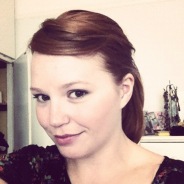
I run a not-for-profit Writing Group, ‘Scribblers’ – we meet once a month to share all types of writing, give and gain feedback, and generally have a jolly nice time 🙂
I LOVE editing others’ writing, and am always open to submissions from budding screen or prose writers.
I’ve completed a BA(hons) in Creative Writing with Film Studies, and an MA in Creative and Critical Writing, which have given me the ability to critique creative work, as well as create it.
Most recently, I’ve been working behind the scenes on short and feature and films, which we hope will premiere in 2013.
TCWA Admin Officer.
Elin Williams

- English Literature graduate of Cardiff University.
- Love writing, directing and producing my own theatre.
- Young critic, reviewing in English and Welsh, writing for a personal blog and Wales Arts Review
- Theatre marketing assistant at a local theatre in the valleys
Rachel Williams

Stage Editor, Buzz | Young Critc | Part Time Civil Servant (to feed my theatrical and literary habits 😉 )
I have completed a BA in Media and Modern Literature and an MA Creative and Media writing.
Currently the Stage Editor for Buzz Magazine and juggling a job to pay the bills.
Always on the look out for new shows or new idea’s, let me know!
http://paradeisosgwynfor.blogspot.com
Fern Coslett

I am currently an A Level student at Stanwell School in the Vale of Glamorgan. I study media along with psychology and Product design. I hope to be going on to study media communications this September. I have my own personal blog in which I write about my favourite artists or songs in the music Industry. I enjoy deconstructing and analysing media texts; and being a part of young critics has allowed me to pursue this further.
http://myrosetintedeyes.blogspot.co.uk/ .
Bethan James

“Bethan is a writer and Young Critic currently focusing on scriptwriting projects. She works in the marketing team at a theatre.
Bethan is interested in theatre that incorporates innovative, participatory, and multi-media elements.”
Chelsey Gillard

Chelsey has been part of the Young Critic’s Scheme since it began in 2010 and is currently studying English and Drama at Cardiff Metropolitan University . She is one of the founding members of Hinge Productions – the university’s drama society and is directing their current production.
As well as writing for the Young Critics Chelsey also regularly contributes to Buzz Magazine and Wales Arts Review. She is passionate about all aspects of theatre and really enjoys innovative and original work, especially physical or circus theatre.
After her degree she hopes to pursue a career in theatre either in a practical sense or as an arts journalist.

